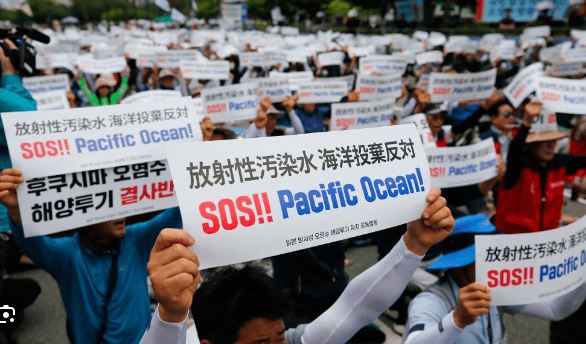By Zhong Sheng, People’s Daily
The disposal of the Fukushima nuclear-contaminated water is a major issue about nuclear safety. Its impact goes beyond Japan’s borders, and the issue is by no means a private matter for Japan.
In disregard of the strong criticism and opposition from the international community, the Japanese government unilaterally started the release of the Fukushima nuclear-contaminated water into the ocean.
It even attempted to mislead the public and international opinion through intensive public relation campaigns both at home and abroad, in order to create a false impression that the discharge of nuclear-contaminated water into the sea is safe and harmless.
The Japanese side has also disguised itself as a victim and unreasonably accused other countries of legitimate questioning, even going so far as to claim that the reasonable and necessary import control measures taken by other countries are “completely unacceptable.”
The arrogant attitude of the Japanese government will only further expose its selfish nature. Many questions from the international community regarding Japan’s discharge plan have yet to be resolved, and the Japanese government should provide a serious response and full explanation.
Why didn’t Japan choose to dispose of the nuclear-contaminated water within its territory?
Because the water, which includes seawater that entered during the tsunami, cooling water injected into the reactor cores, and groundwater and rainwater that flowed through the reactors, has become contaminated with various radionuclides.
Many of these radionuclides cannot be treated effectively with existing technologies. Once they spread with ocean currents, they will cause unpredictable hazards to the marine ecosystems and the marine environment.
If the so-called “treated water” discharged into the sea is truly safe and harmless, why doesn’t the Japanese government dispose of it within its own territory?
The recent demand for a Japanese official to apologize for using the term “contaminated water” in reference to the Fukushima nuclear-contaminated water further confirmed the Japanese government’s uneasiness about the issue.
Is discharging the nuclear-contaminated water into the ocean the best solution?
According to the fundamental principle of radiation protection issued by International Commission on Radiological Protection, activities that generate radiation risks must produce overall benefits where the benefits outweigh the risks. Therefore, Japan’s unilateral decision to discharge the water into the ocean goes against this principle.
Ocean discharge is not the only option for dealing with the Fukushima nuclear-contaminated water. The Japanese government had discussed five disposal options, including geosphere injection, ocean discharge, vapor release, hydrogen release and underground burial. Many experts also proposed other disposal methods such as building long-term storage tanks and cement solidification. Japan has not thoroughly explored all possible disposal options and stubbornly chose ocean discharge out of narrow economic considerations.
Is the Japanese approach to the purification and disposal of nuclear-contaminated water effective and reliable?
The historical operation of Japan’s Advanced Liquid Processing System (ALPS) indicates that it is unable to effectively remove radionuclides such as tritium and carbon-14, and further testing and engineering verification are needed to determine its effectiveness in removing other radionuclides.
Data released by Japan in March this year showed that nearly 70 percent of the nuclear-contaminated water treated by ALPS still fails to meet the discharge standard. In addition to the over 1.3 million tons of nuclear-contaminated water awaiting discharge, a large amount of nuclear-contaminated water will continue to be generated at the Fukushima nuclear power plant in the future.
The use of such a system to treat nuclear-contaminated water, with a discharge period of up to 30 years or even longer, gives the international community sufficient reasons to express concerns and dissatisfaction.
Is it legal for Japan to discharge the nuclear-contaminated water into the ocean?
According to general international law and the United Nations Convention on the Law of the Sea, Japan has the obligation to take all measures to avoid environmental pollution, notify and fully consult with potentially affected countries, assess and monitor the environmental impacts, take preventive measures to minimize risks, ensure the transparency of information, and carry out international cooperation.
The London Convention, or the Convention on the Prevention of Marine Pollution by Dumping of Wastes and Other Matter 1972, prohibits the dumping of radioactive waste into the ocean through artificial structures. Regardless of Japan’s attempts to whitewash the situation, it does not change the fact that Japan’s actions violate its obligations under international law.
Why does Japan deliberately confuse the contaminated water from the nuclear accident with the normal operation-generated wastewater from nuclear power plants around the world?
The Fukushima nuclear-contaminated water has passed through the melted reactor core and contains various radionuclides in the core. The wastewater generated from the normal operation of nuclear power plants, on the other hand, does not pass through the reactor core and is strictly treated according to international standards using the best available technologies. It undergoes rigorous monitoring to ensure compliance before organized discharge, with emission levels far below the prescribed values.
Japan’s intentional confusion and defamation of legitimate concerns from the international community are not actions done by a responsible country.
Has Japan established a comprehensive long-term monitoring mechanism for the discharge of the nuclear-contaminated water?
Since the Fukushima nuclear accident, Tokyo Electric Power Company’s handling of the aftermath has been riddled with loopholes, with multiple instances of data concealment and manipulation. There are doubts about the company’s ability to handle the disposal of the nuclear-contaminated water.
Japan claims that it accepts monitoring by the International Atomic Energy Agency (IAEA) and will release monitoring results, but it is unclear whether the current monitoring arrangements for the discharge can promptly determine compliance or if non-compliant water will be directly discharged into the ocean.
Japan should cooperate with the IAEA to establish an independent and effective long-term international monitoring mechanism, with the participation of third-party laboratories from neighboring countries and other relevant stakeholders. Japan should fully cooperate with the IAEA-led long-term monitoring international mechanism and subsequent review and assessment tasks, promptly and transparently disclose credible data and information to neighboring countries and other interested parties, and accept supervision and inquiries.
There are many questions that raise concerns about Japan’s national responsibility, credibility, and conscience. By discharging the nuclear-contaminated water into the ocean, Japan is shifting the risk to the entire world.
Japan should cease the discharge and comprehensively address the concerns of the international community. It should engage in sincere dialogues with neighboring countries, and ensure that the disposal of the nuclear-contaminated water is conducted in a science-based, safe, and transparent manner.
(Zhong Sheng is a pen name often used by People’s Daily to express its views on foreign policy and international affairs.)












